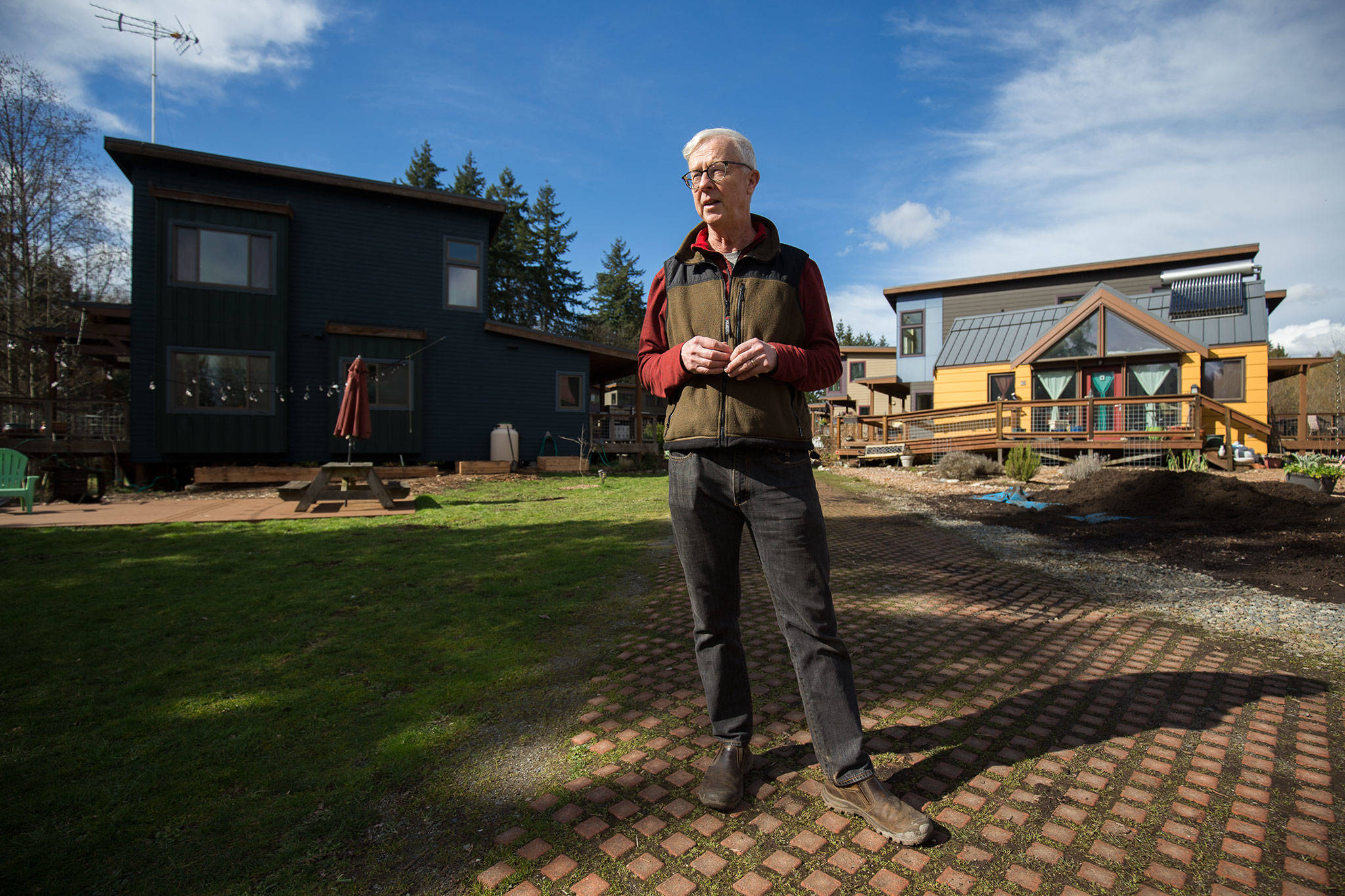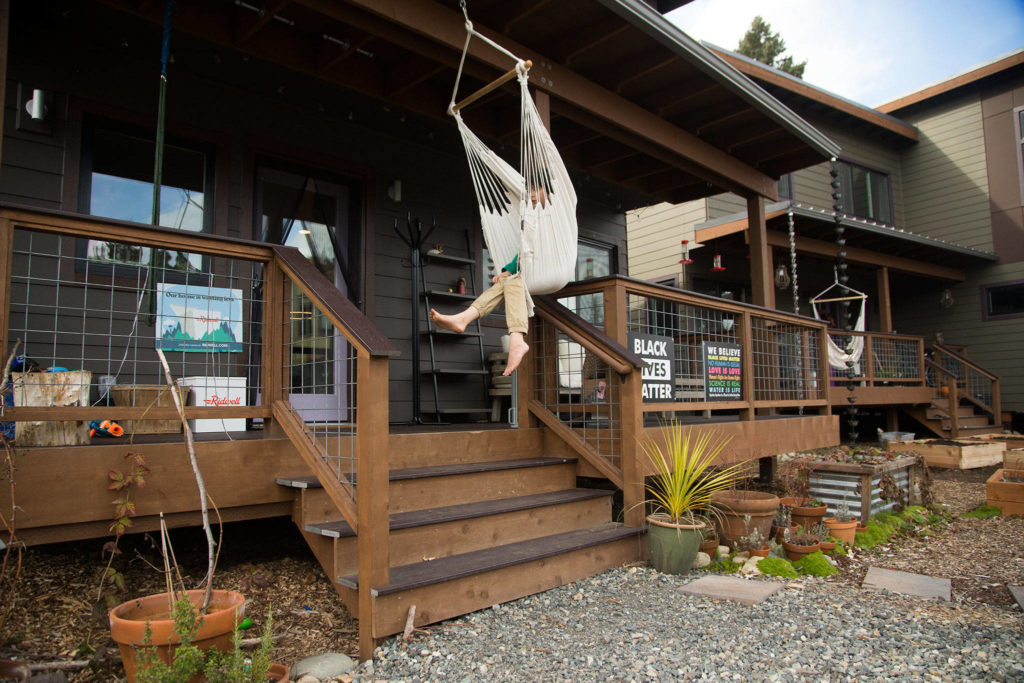EVERETT — Climate change is the second-most-common problem that state Rep. Davina Duerr hears about from her constituents.
Their No. 1 concern? Transportation, which in Washington contributes nearly 45% of the greenhouse gases that drive climate change.
Those woes inspired the Bothell Democrat to co-sponsor House Bill 1099, which would update Washington’s Growth Management Act (GMA). The 30-year-old law was designed to limit growth beyond city boundaries. Among other significant changes, the bill would require that the 10 largest counties plan for climate change by reducing greenhouse gases and vehicle miles traveled, and that all counties prepare for climate impacts such as increased fires and floods.
Duerr’s 1st District is bisected by I-405, which can be a commuter’s nightmare. Mountlake Terrace, Brier, Bothell and Kirkland are on the west; much of unincorporated Snohomish County lies to the east. Policies that reduce the need to commute not only cut greenhouse gases, Duerr said, they save tax money spent on roads, sewers and stormwater systems.
“It helps if those elements are closely packed,” she said. “The more we sprawl, the more there is to maintain.”
HB 1099 is one of many bills related to growth management and zoning that the Legislature is considering. It now goes to the Senate, after being approved by the House of Representatives on a party-line vote of 56 to 41. The legislation has been referred to the Senate Housing & Local Government committee.
Republicans testified that it wasn’t the right tool to address climate change, or they doubted the climate is changing, or they feared it would worsen the housing crisis.
“This is a terrible bill,” said Rep. Robert Sutherland, of Granite Falls, adding that it would exacerbate big-city problems such as “gangs, addicts, squalor and tent cities.” Rep. Cyndy Jacobsen said the bill would put “one more layer of complication” on local governments such as Puyallup, where she serves on the City Council.
In a Feb. 16 hearing, city and county associations also raised concerns about the cost of new mandates. Their lobbying worked, and the bill now includes assurance that they need not meet Growth Management Act requirements without state support. Construction, business and real estate industry representatives objected to potential new limits on building sites. And environmental groups gave the bill full-throated approval.
No group is more eager to see the proposed changes than nonprofit Futurewise, which focuses on land use. Its Washington Can’t Wait campaign puts it this way:
“This year, the Central Puget Sound counties — King, Pierce, Snohomish, and Kitsap — kick off their next comprehensive planning updates, which lock in plans for the next 8 years. If we don’t pass HB 1099 this year, we will lose another decade to plan for a climate-resilient future. The science couldn’t be clearer: that’s a decade we can’t afford to waste.”
If the bill becomes law, its climate change element won’t impact Snohomish County planning. That’s because climate change is already part of the planning process here, said Lisa Dulude, county energy and sustainability manager.
“At least in my reading of the bill, we’re doing and planning to do what it’s proposing,” she said. “We’ll definitely have all of the elements … adaptation and mitigation, interim targets, transportation and clean fuels.”
The bill mandates the creation of model climate change ordinances for local governments that don’t yet have them, and that’s where Dulude foresees statewide impact. The ordinances are essentially templates, created by the state Department of Commerce, which cities and counties could adopt or use as a starting point for writing their own. Commerce would get the lion’s share of state agency money called for by the bill — $8.2 million over six years.
Tom Campbell, chairperson of the volunteer Snohomish County Climate Action Advisory Committee, helped write the original Growth Management Act when he was chief policy advisor to the speaker of the state House. Back then, he said, climate change wasn’t discussed much. Transportation was.
Campbell wants Snohomish County to move ahead with climate-friendly regulations, in parallel if not ahead of updated state law.
“If the comprehensive plan element (of the legislation) is adopted, the Department of Commerce is charged with coming up with model ordinances and guidelines to go along with it — and they take forever,” said Campbell, who once served as a deputy director in that department.
HB 1099 would give the state Department of Ecology regulatory authority over greenhouse gas emissions, Campbell noted.
“That’s a bit different — so far, there has been local control, not so many state standards,” he said. “This has always been a tension in growth management planning: What is the state’s role? One can argue that climate change is a new ballgame, that we have to do better at it. It’s an emergency.”
Campbell developed Clearwater Commons, the sustainable subdivision where he lives. He said homebuilders generally agree that denser, multi-family housing fills a need. “Their concern is a lack of buildable areas. It’s easier to push out an urban growth boundary than to do in-fill,” he said. “Here in Snohomish County, we have a Southwest urban growth area where people want to push low-density sprawl.”
Bryce Yadon, government representative for Futurewise, said there are enough parcels within current urban growth boundaries to meet the demand for housing. More rowhouses and duplexes will drive down housing costs, he said, though he acknowledged that the “further-out, single-family lot” would be less available under an updated GMA.
“Our bill isn’t restricting available lands,” he said. “We’re saying, ‘Do it in a more holistic way and give people what they want.’”
That’s not how the Building Industry Association of Washington sees it. Its communications director, Janelle Guthrie, said the proposed Growth Management Act changes would make it harder to find single-family housing statewide.
“This bill severely limits rural residential development, which is already limited,” Guthrie said. “Rural communities need housing, too. People need more choices when it comes to where they can live, not less.”
One aspect of HB 1099 does not seem controversial. That is the requirement that local governments consider environmental justice. For example, planners should be sure that a largely minority community isn’t left out of easy access to mass transportation or affordable housing.
The 31-page bill also includes a reference to sea level rise in the Shoreline Management Act — which is older than, but incorporated into, the Growth Management Act. And it replaces references to “bicyclists and pedestrians” with “active transportation,” a broad category that includes wheelchairs, scooters and skateboards. In other words, an updated GMA would require planners to consider not just mass transit and roads, but sidewalks, too.
Julie Titone is an Everett writer who can be reached at julietitone@icloud.com. Her climate change reporting is supported by the Herald’s Environmental and Climate Reporting Fund.
Talk to us
> Give us your news tips.
> Send us a letter to the editor.
> More Herald contact information.



























